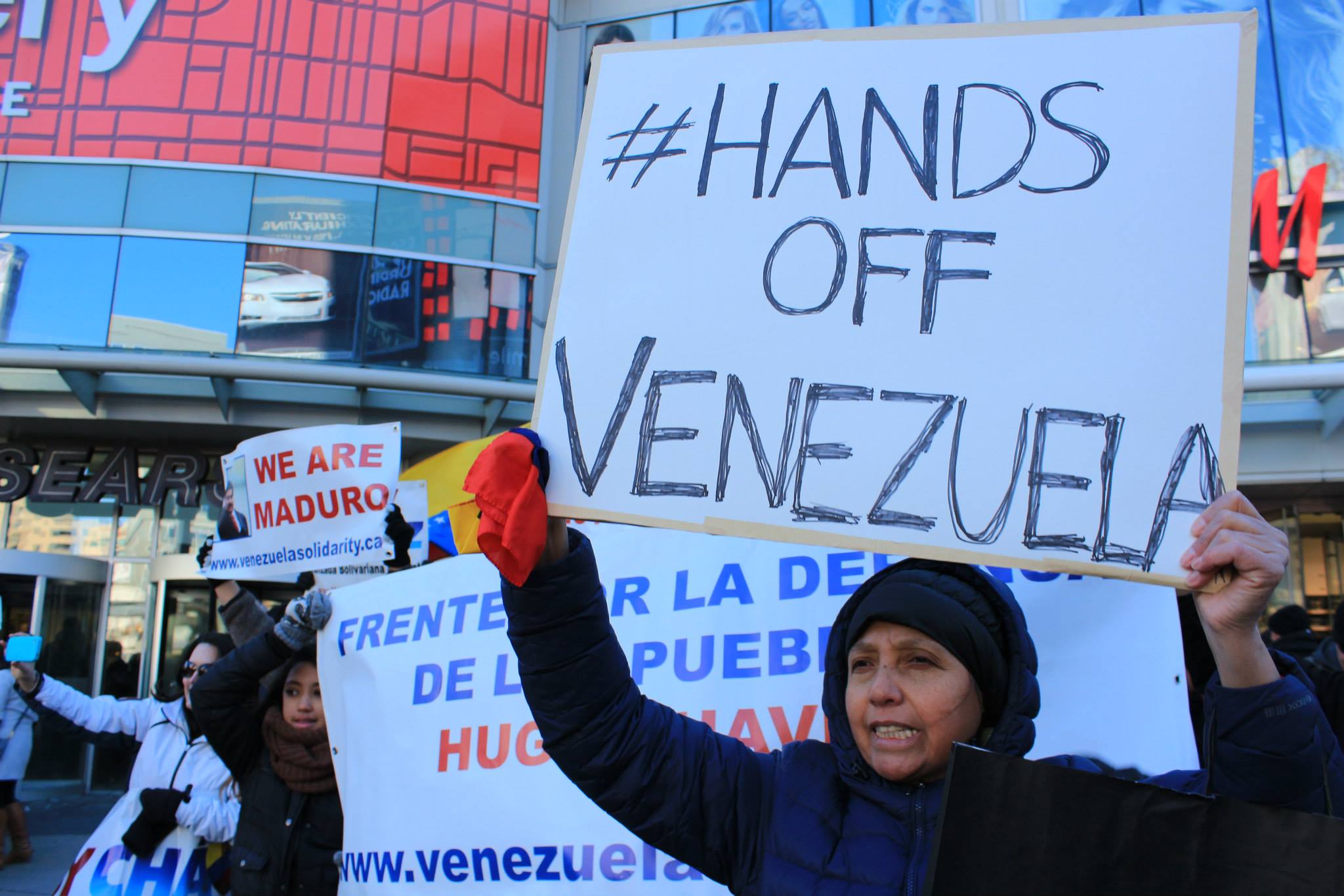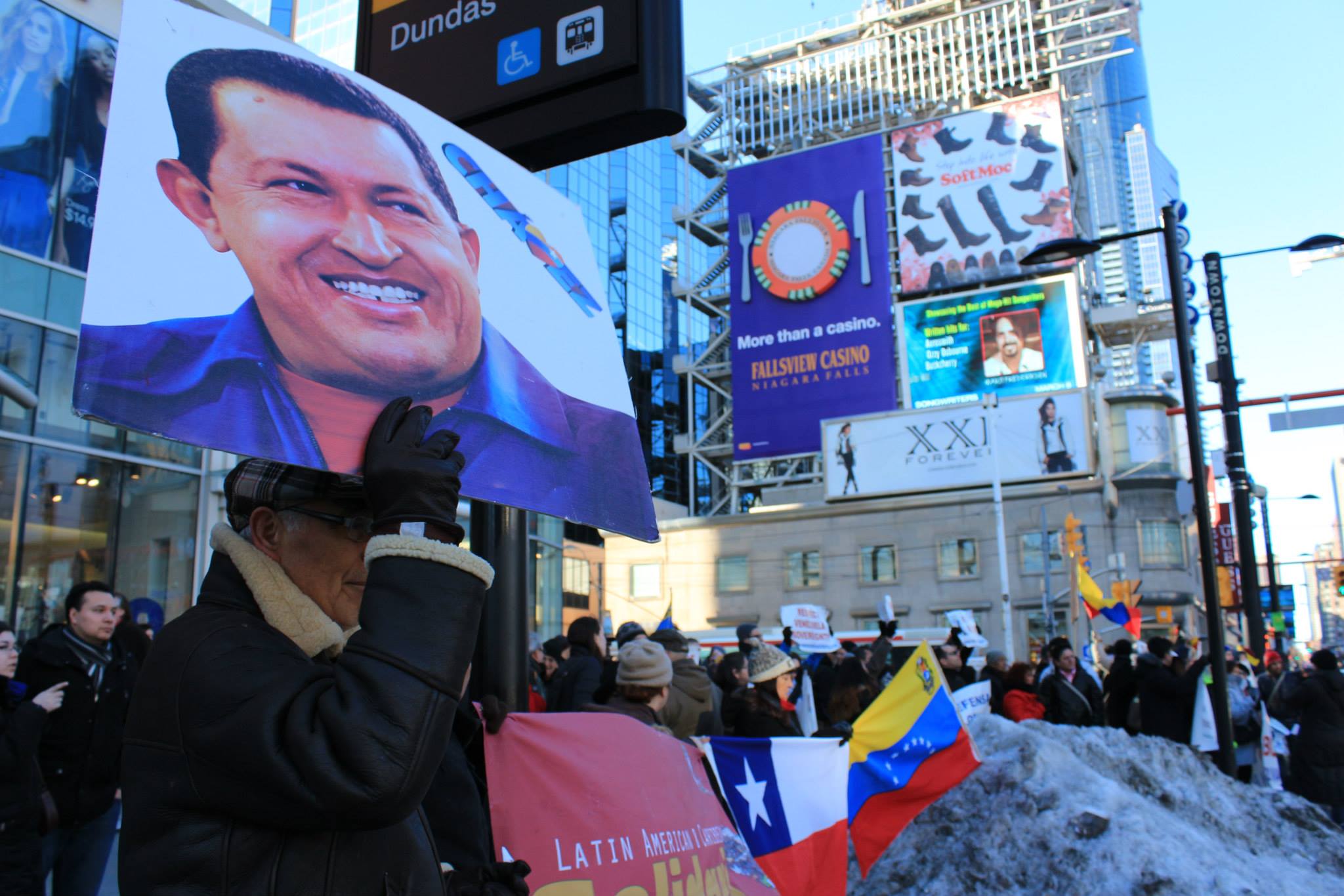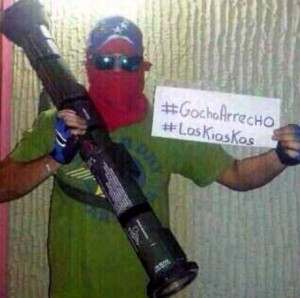by Pragash Pio and Hassan Reyes
Several hundred people gathered at Toronto’s Dundas Square on February 22 in response to violence in Venezuela which started at the beginning of the month.
 Two sharply divided groups formed and faced off across Yonge Street. On one side, a group of 100 activists responding to the call from the
Hugo Chavez People’s Defense Front
rallied in support of the Bolivarian revolutionary and socialist process, the Maduro government and Venezuelan sovereignty. While denouncing the violence that has claimed 10 lives thus far, they agreed with the calls from Venezuelan popular movements that the violence and rioting is being organized by right-wing extremists. This pro-Maduro pro-’Bolivarian’ group held signs saying #WeAreMaduro and #HandsOffVenezuela.
Two sharply divided groups formed and faced off across Yonge Street. On one side, a group of 100 activists responding to the call from the
Hugo Chavez People’s Defense Front
rallied in support of the Bolivarian revolutionary and socialist process, the Maduro government and Venezuelan sovereignty. While denouncing the violence that has claimed 10 lives thus far, they agreed with the calls from Venezuelan popular movements that the violence and rioting is being organized by right-wing extremists. This pro-Maduro pro-’Bolivarian’ group held signs saying #WeAreMaduro and #HandsOffVenezuela.
On the other side, a larger group of 500-600 people rallied against the popularly elected Maduro government, denouncing the supposed “human rights violations” taking place there. The group, mostly comprised of Venezuelans who have left Venezuela since the Bolivarian Revolution and students in Canada to study English, not only held signs saying #SOSVenezuala and #PrayForVenezuela but also held signs denouncing socialism and the influence of “Cubans.”
Initially the conflicting slogans and the abundance of Venezuelan flags may have been confusing, with even veteran activists walking into the wrong group, but the underlying message were as different as day and night. It was a standoff between those who wished to defend and preserve the popular gains in Venezuela under Chavez, and those who were calling for American intervention in Venezuela.
Mistaking riots for popular democracy
The declared grievances of anti-Maduor ‘anti-Bolivarian’ protesters could be broken down into two parts: first, that President Maduro is a dictator, repressing peaceful opposition students and media; and secondly that problems of social and economic insecurity are a result of the administration’s “corruption” and “mismanagement.” Incidentally, these arguments mirror the language of the anti-Chavista Western media as well as Venezuela’s extreme right-wing.
These claims may emotionally resonate for some recent Venezuelan emigrès, who often came from the wealthy elite who immigrated to Canada to keep their economic privileges from being redistributed in Venezuela, but the facts on the ground are completely reversed.
Following the attempted coup d’etat against Chavez in 2002, in which corporate media played an active role in organizing, the government and grassroots movements have placed significant emphasis on the democratization of media. This has included the creation of hundreds of community radio and TV stations. Nonetheless, the private corporate media still controls over 70% of the all media. Not surprisingly, the private media outlets are often openly against the government. Still, the only restrictions placed on media, similar to those placed on media in Canada by the Canadian Radio and Television Commission (CRTC), relate to not falsifying information, calling for violence, displaying nudity at certain times, etc.
More importantly Maduro, and Chavez before him, have both had resounding popular electoral mandates that have been repeatedly tested through free elections. Out of 19 elections in the last 15 years, 18 have been resounding victories for the ‘Chavistas’, including two elections in the last year. Former US President Jimmy Carter even classified the election process in Venezuela as “the best in the world” following the 2012 re-election of Chavez.
On the other hand leaders of the opposition, such as Leopoldo Lopez, Antonio Ledezma and Maria Corina Machado cynically claim to be in favour of democracy and human rights, while glossing over their history of involvement in the 2002 coup as well as human rights abuses and corruption before the Bolivarian process began. Today they also reject the democratically-elected administration and structures, calling their supporters to engage violence instead to topple a legitimate government.
 Pro-Maduro activists noted that Venezuela is one of the few countries to actually have an electoral recall mechanism by which citizens can remove the president. Note that Canada doesn’t even have such a democratic tool, even for likes of Rob Ford. This was an option that the opposition actually tried to use against Chavez in 2004, but failed as the majority (58%) voted to not recall Chavez. 10 years later, the very same opposition has abandoned all democratic options and turned to violence because it knows it cannot win against Maduro’s popular mandate.
Pro-Maduro activists noted that Venezuela is one of the few countries to actually have an electoral recall mechanism by which citizens can remove the president. Note that Canada doesn’t even have such a democratic tool, even for likes of Rob Ford. This was an option that the opposition actually tried to use against Chavez in 2004, but failed as the majority (58%) voted to not recall Chavez. 10 years later, the very same opposition has abandoned all democratic options and turned to violence because it knows it cannot win against Maduro’s popular mandate.
Several pro-Maduro activists declared is the reasons for this record of electoral success is that the administrations of Chavez-Maduro have empowered and drastically improved the living conditions of the majority of Venezuelans. Under Chavez, and now Maduro, Venezuela has made incredible economic and social progress: halving unemployment and poverty; more than doubling GDP per Capita; creating free public universal healthcare system; and doubling access to higher education through free tuition, according to the Guardian’s “Data Blog.”
While access to goods and insecurity remain a problem in Venezuela, the Maduro administration has also begun to tackle these problems with new controls against hoarding and withholding of goods (as many store owners were caught doing) as well as price controls and initiatives against price gouging of the public. These have also begun to show positive results, according to scholar George Ciccariello-Maher .
The vast majority of Venezuelans, especially the poor, have continually shown that they approve of the Bolivarian process. At the same time, most observers and even opposition politicians acknowledge that the majority of Venezuelans have very little in common with and connection to the wealthy, pro-American right-wing opposition. As concerned Venezuelano Nico put it, “If the pro-democracy opposition is actually pro-democracy and popular, then they should go and win an election instead of rioting after losing every election.”
Rejecting the riots in favour of popular democracy
Pro-Maduro/pro-Bolivarian activists also pointed out that the riots had all the markings of another American sponsored attack on Venezuela’s Bolivarian Revolution. The Hugo Chavez People’s Defense Front’s statement, supported by a number of different anti-imperialist and progressive groups in Canada, condemned “the violence perpetrated by a small sector of the fascist right-wing in different cities across Venezuela in the last days, in an attempt to destabilize the country in a similar fashion as it was done with President Hugo Chávez, on April 2002.”
Of the 10 people killed in violence thus far, nearly all have been victims of the violence being organized by sectors of the extreme right . In addition, protesters have attacked public property including primary schools and food supply trucks. With strong evidence of continued U.S. State Department involvement since the first 2002 coup against Chavez ( Wikileaks release ), there is also growing evidence [ here & here ] that opposition activists are exaggerating claims of “repression,” to support further American intervention in Venezuela.
Police informed BASICS videographer Camila R. that the anti-Maduro group had secured a permit for Yonge and Dundas Square beforehand and that no other political groups could use the space. Activists raised questions about the amount of funds and behind-the-scenes direction that would have been needed to accomplish this.
As activists with Hugo Chavez People’s Defense Front chanted, “Viva Chávez! Viva Maduro!”, it was clear who they stood with, and why. Their only question is where all the other pro-socialist, pro-revolutionary, and pro-democracy Canadian groups stood: With the popularly elected administration of Venezuela, or the emissaries of American intervention?
Comments



Pingback: (VIDEO) Rightwing Venezuelan figure courted at Scotia Bank Building in Toronto | Hugo Chavez Front
Pingback: Rightwing Venezuelan figure courted at Scotia Bank Building in Toronto | Hugo Chavez PDF